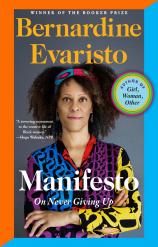Manifesto: On Never Giving Up
Review
Manifesto: On Never Giving Up
Bernardine Evaristo is the classic case of a writer who became an “overnight success” after working for four decades at her craft. When she shared the Booker Prize in 2019 with Margaret Atwood for her novel, GIRL, WOMAN, OTHER, it clearly represented the pinnacle of a long career. But the British poet, novelist and dramatist’s lack of wide public recognition wasn’t for lack of prodigious effort, often against daunting odds.
Evaristo surveys her life and career in her spirited memoir, MANIFESTO: On Never Giving Up. It’s both a candid account of how it felt to grow up as the child of a biracial marriage in a racist British society and a refreshingly honest portrait of the highs and lows of the artistic existence.
Born in 1959 to a Nigerian father who emigrated to England 10 years earlier and a white English mother --- “the ultimate yin-yang couple” --- Evaristo spares nothing in condemning the persistent bigotry she and her family experienced, including frequent vandalism of the home she shared with seven siblings. “Black was bad and white was good,” she writes, in summing up the cruel facts of British life in those years.
"[MANIFESTO is] both a candid account of how it felt to grow up as the child of a biracial marriage in a racist British society and a refreshingly honest portrait of the highs and lows of the artistic existence."
Her barely communicative, emotionally distant father, a harsh disciplinarian, worked as a welder, but he was always considered part of the “brown immigrant class” rather than solidly working class like his white counterparts. Evaristo’s mother’s marriage to a Black man assured her own downward mobility. She describes her mother, a teacher who raised her children in the Catholic Church, as “an amazing, brave and honourable woman,” someone with a “kind of earth-mother vibe going on, which counterbalanced our father’s authoritarian parenting.”
Soon after graduating from the Rose Bruford College of Speech and Drama, Evaristo joined with two colleagues to create Theatre of Black Women, whose productions featured “an experimental mixture of dramatic poetry, minimalist sets, movement and music --- a theatrical collage, a poetry theatre.” Evaristo was the last remaining founder before she closed the company when funding evaporated, but as a committed feminist she’s justifiably proud of its success in creating and promoting the work of Black female actors, writers and directors.
Over the next couple of decades, Evaristo’s life was marked by nonstop work and an equally nonstop series of moves from one modest London dwelling to another. “In my case,” she concedes, “my creative life choices had led to peripeteia and precarity, although, of course, for many people they do not.”
Among the most frank portions of the memoir are Evaristo’s glimpses of her romantic life and the transition in her sexual orientation. In her 20s, she considered herself a lesbian, and that decade featured what she describes as a “torture affair” with a woman twice her age whom she calls “The Mental Dominatrix.” For Evaristo, their relationship, which for a time seriously impaired her creativity, “resembled being incarcerated in Alcatraz.”
When she began dating men, she confesses that after a few years of a revolving succession of partners, “I wanted to be in a proper relationship, but it eluded me.” She realized that before she met her husband on a dating website in 2005, “I’d had mostly unsatisfactory relationships, or periods where I sought relationships, which had taken up emotional energy and headspace. I realized that making a public and legal commitment to David in marriage had freed me up to get on with the other areas of my life --- the most important of which is my writing.”
Evaristo’s fans and fellow writers will appreciate her efficient survey of her novels and the process of creative experimentation with a variety of literary forms over seven previous works that culminated in GIRL, WOMAN, OTHER, a work of “fusion fiction” she calls a “polyphonic paean to black British womanhood and to non-binary people, in all our flawed complexity.” Rather than shaping her art to respond to popular trends, her journey is a quietly inspiring one of perseverance and an unswerving commitment to a determined artistic vision.
Whether it’s drama, poetry or fiction, Evaristo, who has taught creative writing for nearly 30 years and now serves as President of the Royal Society of Literature, leaves no doubt that work has always been the paramount value in her life, even as she acknowledges the high price she paid for it in some of her personal relationships. For all the sacrifices that single-mindedness has exacted, one senses that even if offered the chance she would change none of it.
In the brief manifesto that concludes the memoir --- a summing up of Evaristo’s personal and professional creed --- she urges artists to “be wild, disobedient & daring with your creativity, take risks instead of following predictable routes; those who play it safe do not advance our culture or civilization.” She’s lived her life fiercely in accord with those values. The proof of that lies in her vibrant art; when it comes to that, she clearly considers herself far from done.
Reviewed by Harvey Freedenberg on January 28, 2022
Manifesto: On Never Giving Up
- Publication Date: January 10, 2023
- Genres: Memoir, Nonfiction
- Paperback: 256 pages
- Publisher: Grove Press
- ISBN-10: 0802160409
- ISBN-13: 9780802160409




